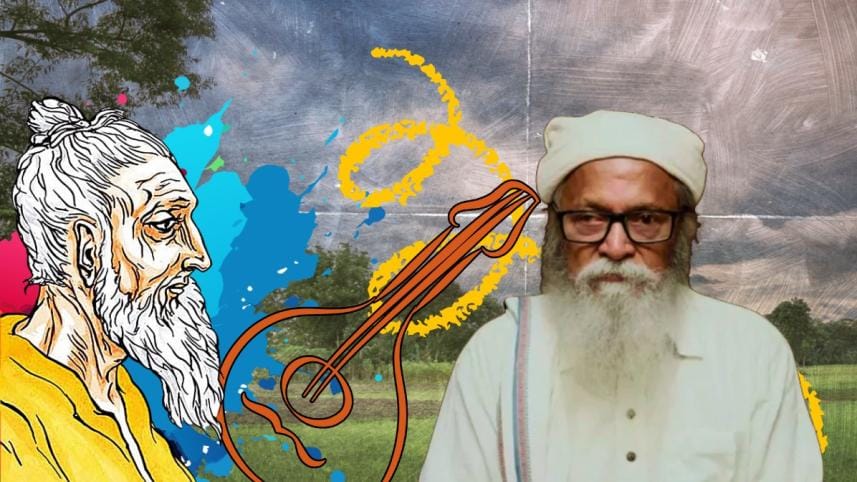Farhad Mazhar and the Being of Lalon Fakir

Farhad Mazhar has long stood at the unpredictable intersection of poetry, politics, and philosophy. To some, he is a Marxist agitator; to others, a mystical seeker; to many, an enigma. But labels do little justice to someone whose intellectual project cuts across established categories, with little regard for academic gatekeeping or ideological loyalty. At the heart of his recent work lies a remarkable effort to excavate the philosophical foundations of Baul thought—particularly in the songs and sayings of Lalon Fakir—and to place them in conversation with some of the most challenging figures of European thought. This effort, spanning his books Bhabandolon (Mowla Brothers, 2008) and Shainjir Doinno Gyan (Mowla Brothers, 2009), reveals a thinker who is not merely interpreting tradition, but actively reimagining it as a living philosophical resource.
Mazhar's encounter with Lalon is not the sentimental recuperation of a folk icon. Nor is it the academic cataloguing of an "obscure religious cult" of the sort once found in colonial ethnographies. Instead, Mazhar approaches Lalon as a philosopher in his own right, a vernacular phenomenologist whose concept of 'odhora' (the ungraspable, the ever-elusive) anticipates–and perhaps even exceeds–Heidegger's quest for 'Being'. If this sounds implausible, Mazhar is happy to show his work. Through dense, often exhilarating pages, he draws out the resonances between Lalon's "Moner Manush"', his elusive 'man within the mind', and the ontological ambiguity that haunts Heidegger's 'sein'. What Heidegger attempts in the abstract, Lalon performs through song. What Mazhar does is hold them together long enough for the sparks to fly.
Of course, Mazhar's interest in Lalon is not limited to metaphysics; it is deeply political too. His reinterpretation of Nityananda–Sri Chaitanya's companion and, in Mazhar's telling, the true initiator of Bengal's revolutionary Bhav movement—allows him to distinguish between bhakti and bhav, between a scriptural devotion tied to Brahminical hierarchy and a folk ontology rooted in bodily practice, sensuality, and resistance. For Mazhar, the spiritual power of Lalon lies not in his rejection of the world, but in his radical commitment to transforming it. The bhav of Nadia is not a mystical escape but a philosophical ground for dismantling caste, class, and coloniality.
There is also the matter of language. Mazhar is acutely aware that bhav cannot be cleanly translated into "idea", "emotion," or "feeling"; it hovers between concept and experience, between thought and embodiment. This is why he insists on staying within the Bangla tradition, not out of parochial loyalty but because that is where the term lives. In doing so, he also shows how language is not simply a medium of expression but a condition of thought. Lalon's verbal artistry is, in this sense, a philosophical labour.
Mazhar has never claimed to be an academic philosopher. He didn't finish his studies in New York, though he read widely—Heidegger, Marx, Lenin, Foucault, Derrida—and debated fiercely. Many of the Marxist formulations that later found their way into the works of Gayatri Spivak were already present in his Bangla essays. He used to joke about it. He wasn't bitter. Spivak became a theorist; Mazhar remained a street philosopher. He writes for his fellow men, as he often says, to change their minds, so that they may build the Bengali state that never quite arrived in 1971.
This dream of a Bengali state, grounded in justice and governed perhaps by a philosopher-king, carries more than a whiff of Plato. Mazhar is aware of this, and somewhere in his writings is the dry smile of a man who knows Christendom too was ruled by such philosophers. But even so, he insists on the necessity of ideas. Without bhav, there is no future.
What makes Mazhar unique is that he takes philosophy out of the university and places it alongside farming, folklore, song, and soil. His work with rural farmers, his critique of global agribusiness, and his revival of traditional agricultural knowledge are not a detour from philosophy; they are its continuation by other means. The bhav-centered resistance to Monsanto and Cargill is as central to his thinking as any reading of Hegel or Heidegger.
Farhad Mazhar remains a controversial figure, but that hardly matters here. The real question is: Who else in Bangladesh has tried to think so deeply, so seriously, and so originally with the resources of both east and the west? Who else has dared to place Lalon in conversation with Heidegger or Nityananda in opposition to Puri's temple theology? Who else has shown, with such care and force, that folk philosophy is philosophy—and that it may be the only kind that matters?
Dr Salahuddin Ayub is Professor and Chair, Department of Criminal Justice, Philosophy, and Political Science, Chicago State University. He is the author of several books including Farashi Tattwa, Paul de Man o Shahityer Agastyayatra (Bangla Academy, 2018). Email him at msalahud@csu.edu.



 For all latest news, follow The Daily Star's Google News channel.
For all latest news, follow The Daily Star's Google News channel.
Comments